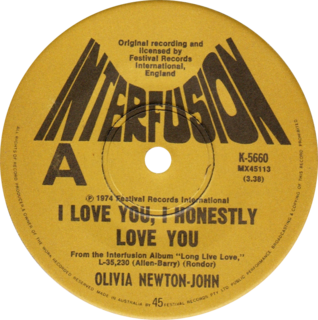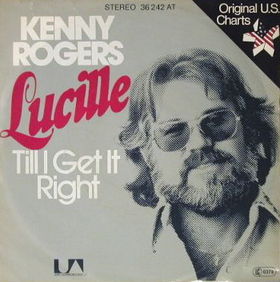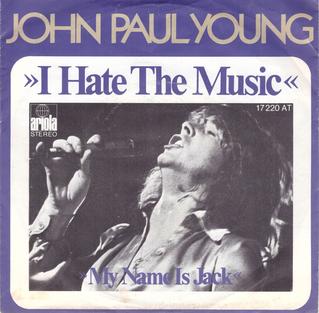
"I Honestly Love You" is a song recorded by Olivia Newton-John released in 1974 on the album Long Live Love in United Kingdom and If You Love Me, Let Me Know in the United States. The song became a worldwide pop hit, her first number-one single in the United States and Canada. It remained her signature solo song until the 1981 hit "Physical". The single was first released in Australia as "I Love You, I Honestly Love You", as per its chorus. The song was written by Jeff Barry and Australian singer and composer Peter Allen. The latter recorded it around the same time for his album Continental American.

John Robert Williamson is an Australian country music and folk music singer-songwriter, multi-instrumentalist, television host and conservationist. Williamson usually writes and performs songs that relate to the history and culture of Australia, particularly the outback, in a similar vein to Slim Dusty and Buddy Williams before him. Williamson has released over fifty albums, ten videos, five DVDs, and two lyric books and has sold more than 4,000,000 albums in Australia. His best known hit is "True Blue". On Australia Day in 1992 Williamson was made a Member of the Order of Australia (AM) with the citation: "for service to Australian country music and in stimulating awareness of conservation issues". He has received twenty-six Golden Guitar trophies at the Country Music Awards of Australia, he has won three ARIA Music Awards for Best Country Album and, in 2010, was inducted into the related Hall of Fame.
"True Blue" is an Australian folk song written and performed by singer-songwriter John Williamson. The lyrical content utilises Australian slang heavily, with the title meaning authentically Australian . The song was released in March 1982 as a single from True Blue - The Best of John Williamson, but failed to chart.

"Electric Blue" is a song by the Australian rock / synthpop band Icehouse. It was co-written by Iva Davies of Icehouse and John Oates of the U.S. band Hall & Oates. Oates became involved with Davies after contacting him to state he was a fan. The resulting collaboration produced this song and Oates has stated that if Davies had not released the song under the Icehouse name then it would have been a Hall and Oates track.

"Lucille" is a song written by Roger Bowling and Hal Bynum, and recorded by American country music artist Kenny Rogers. It was released in January 1977 as the second and final single from the album Kenny Rogers. It became Rogers' first major hit as a solo artist after leaving the successful country/rock group The First Edition the previous year. An international hit, it reached number 1 on the Billboard Country Singles chart and number 5 on the Billboard Hot 100. Overseas, "Lucille" reached the top of the UK Singles Chart in June 1977, the first of Rogers' two number one singles there.

"Only 19", "I Was Only 19" or "A Walk in the Light Green" is the most widely recognised song by Australian folk group Redgum. The song was released in March 1983 as a single, which hit number one on the national Kent Music Report Singles Chart for two weeks. It was also recorded for Redgum's live album Caught in the Act released in June, which stayed in the top 40 of the Kent Music Report Albums Chart for four months. Royalties for the song go to the Vietnam Veterans Association of Australia. It is in the Australasian Performing Right Association's Top 30 Australian Songs of all time.

"Overkill" is a song by Australian pop rock band Men at Work. It was released in March 1983 as the second single from their second studio album Cargo. Written by lead singer Colin Hay, it peaked at No. 3 on the Billboard Hot 100; No. 5 on the Australian Kent Music Report Singles Chart; and top 10 in Canada, Ireland, and Norway. The song was a departure from the group's style of reggae-influenced pop rock, featuring a melancholic feel musically and lyrically.

"Just Like Fire Would" is a song by Australian alternative rock band, the Saints, which is written by the band's lead singer, Chris Bailey, and was released as a single in March 1986. It was the lead single from their seventh studio album, All Fools Day, and peaked at No. 29 on the Kent Music Report Singles Chart. It was produced by Hugh Jones, who had co-produced the album with Bailey. AllMusic's John Dougan reviewed All Fools Day and opined, "One listen to songs as grabbing as 'Celtic Ballad' or the great 'Just Like Fire Would' will convince you that despite the differences, the new Saints were a good band for completely different reasons than the old Saints."
Bill and Boyd were a pop music duo from 1959 to 1989 consisting of William "Bill" Cate and William "Boyd" Robertson, both on lead vocals and lead guitar, which started recording in 1960. They began their careers in Wellington, New Zealand before relocating to Sydney by 1964. In 1968 they toured United States supporting The Supremes and Herb Alpert.

"I Hate the Music" is a pop song written by George Young and Harry Vanda and recorded by Australian pop singer John Paul Young. The song was released in March 1976 as the lead single from the singer's second studio album, J.P.Y. (1976). It peaked at number 2 on the Kent Music Report in Australia, remaining on the chart for 20 weeks. It was certified gold in Australia. It reached number 1 on the South African singles chart.
Ronald Stewart Tudor MBE was an Australian music producer, engineer, label owner and record industry executive. He started his career with W&G Records in 1956 as a sales representative; he became their in-house producer and A&R agent before leaving in 1966.
Fable Records was an Australian independent record company which operated from 1970 to 1984. It was one of the most successful and productive Australian 'indie' labels of the period, issuing over 300 singles and dozens of EPs and LPs. Fable made a significant initial impact in Australia in 1970-71, scoring a string of hits by new Australian artists, and throughout its history the company discovered and promoted local talent. Fable enjoyed further success between 1972 and 1975 through its subsidiary label Bootleg Records, which racked up a string of hit albums and singles by artists including Brian Cadd, the Bootleg Family Band and Kerrie Biddell.
The discography of John Williamson, an Australian singer-songwriter, consists of twenty studio albums, twenty-four compilation album, eight live album, three EPs. Williamson has sold over 4 million records in Australia.

John Williamson is the debut studio album by Australian country music artist John Williamson. It was released in 1970.

Mallee Boy is the sixth studio album by Australian country music artist John Williamson. The album was released in November 1986 and peaked at number 9 on the Kent Music Report; becoming Williamson's first top ten album.

All the Best is a compilation album by Australian country music artist John Williamson. The album was released in July 1986 and peaked at number 27 on the Kent Music Report. The album includes Williamson's debut single "Old Man Emu" from 1970 and includes one new track "Goodbye Blinky Bill".

JW's Family Album is the ninth studio album by Australian country music artist John Williamson. The album was released in October 1990 and peaked at number 21 on the ARIA Charts and was certified platinum. It included a re-recording of Williamson's debut single "Old Man Emu" with a new "Dingo Verse".

Old Man Emu is the debut extended play by Australian country music artist John Williamson. It was released in January 1973.

The Smell of Gum Leaves is the second solo live album by Australian country music artist John Williamson. The album was released in September 1984 and become Williamsons' first charting album; peaking at number 49 on the Kent Music Report.

Singing in the Suburbs is the first solo live album by Australian country music artist John Williamson. The album was released in 1983. The album included the track "The Vasectomy Song", which peaked at number 28 on the Kent Music Report, which remains Williamson's second highest-charting single, behind "Old Man Emu".















